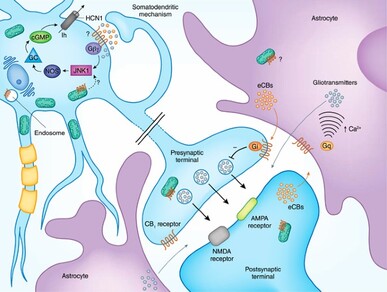
CB1 Receptors
The CB1 receptor, a key component of the endocannabinoid system (ECS), plays a crucial role in the regulation of mood and can significantly impact mood disorders.
Endocannabinoid System (ECS)
A complex regulatory network in the human body involved in various physiological processes, including mood regulation, stress response, pain perception, and immune function. The ECS comprises cannabinoid receptors (CB1 and CB2), endocannabinoids (naturally occurring compounds produced by the body), and enzymes responsible for synthesizing and degrading endocannabinoids.
- CB1 Receptors and Their Distribution
CB1 receptors are primarily located in the central nervous system (CNS), including the brain regions associated with mood regulation. These receptors are abundant in areas like the prefrontal cortex, amygdala, hippocampus, and the basal ganglia, all of which have critical roles in emotional processing and mood control.
- Modulation of Neurotransmitter Release
CB1 receptors regulate the release of neurotransmitters, the chemical messengers in the brain that play a pivotal role in mood regulation. When activated by endocannabinoids or exogenous cannabinoids like THC (the psychoactive compound in cannabis), CB1 receptors can modulate the release of various neurotransmitters:*Serotonin: CB1 receptor activation can influence serotonin release, which is crucial for mood regulation. Dysregulation of serotonin is associated with mood disorders like depression and anxiety.*Dopamine: CB1 receptors can also impact dopamine release, a neurotransmitter linked to pleasure and reward. Altered dopamine levels are implicated in mood disorders such as bipolar disorder and depression.
- CB1 Receptors and Stress Response
Chronic stress is a known trigger for mood disorders. The ECS, through CB1 receptor signaling, helps regulate the release of stress hormones like cortisol. Dysregulation of this system can contribute to mood instability and stress-related disorders.
- Dysregulation in Mood Disorders
Changes in the density and function of CB1 receptors, alterations in endocannabinoid levels, or disrupted signaling pathways contribute to the development and persistence of mood disorders.
- Therapeutic Implications
Medications that modulate the ECS, such as selective CB1 receptor agonists or antagonists, are being explored.The CB1 receptor, as a fundamental component of the endocannabinoid system, exerts significant influence over mood regulation. Dysregulation of this system can contribute to the development and maintenance of mood disorders. There is significant potential for novel therapeutic approaches targeting the ECS in the management of mood disorders.